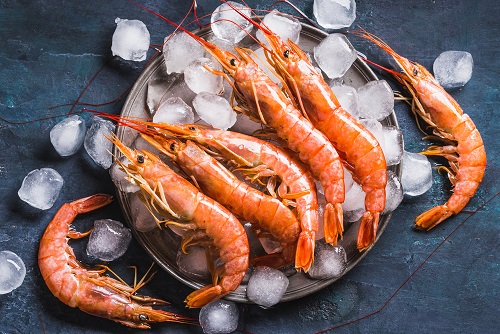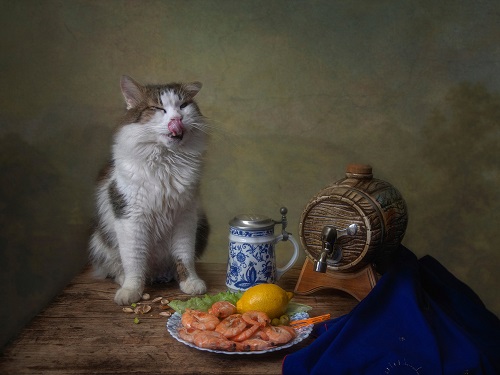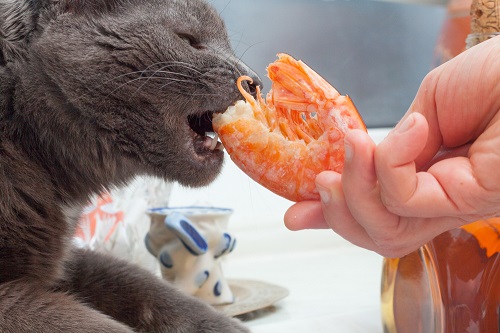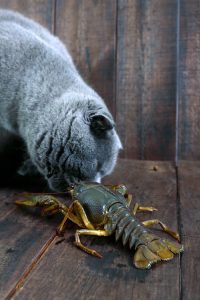Wondering if your pet can climb the ladder from fish and move to other seafood? We can address one of your concerns – “Can Cats Eat Shrimp?”
While fish is a usual snack for felines, Can Cats Eat Shrimp? Before feeding your cat this type of seafood, there are a few things to consider. This article will discuss the health benefits and potential risks associated with feeding cats shrimp, as well as offer some tips on how to prepare the shrimp safely for cats.
Can Cats Eat Grits? Find out here
What Are Shrimps?

Shrimps are a type of small shellfish that are closely related to crabs and lobsters. They are an essential source of food, especially in coastal areas, and are often used in a variety of dishes. Shrimps have a mild flavor and a delicate texture and can be prepared in a variety of ways, including boiling, steaming, grilling, and sautéing.
Can Cats Eat Shrimps?
Shrimp may be your favorite seafood, but is it safe to share it with your cat?
The answer is yes! Shrimp is safe for cats to eat. It contains many nutrients that can be beneficial for the feline stomach. However, as with all food items, shrimp should be fed to cats in moderation. If you keep a few things in mind, like cooking and cleaning it properly, your cat can enjoy this delicious seafood along with you.
Are Shrimps Toxic For Cats?
No, shrimps are not toxic for cats as long they are served in moderation and with the proper technique.
The things that can be toxic for cats are the ingredients in shrimp, like condiments and seasonings. Additionally, there may be bacteria on the outer layer of the shrimp that can harm a cat’s digestive system.
So, well-cooked and unseasoned shrimp is non-toxic for cats.
Do Shrimps Contain Any Nutritional Value For Cats?

Yes, shrimps do contain the following nutritional value for cats –
- High-quality protein: Essential for the health and growth of cats.
- Low fat levels: Prevents weight gain or obesity.
- Essential amino acids: Helps the cats build and maintain muscle mass.
- Other: A variety of vitamins and minerals, including Vitamin A, B vitamins, omega-3 fatty acids, iodine, zinc, selenium, and calcium. These nutrients help cats maintain healthy skin, coat, and bones, as well as aiding in proper digestion and metabolism.
How To Feed Shrimps To Cats?
Here’s a detailed guide to feeding shrimps safely to cats –
- Prepare: It is essential to properly clean the shrimp before cooking it to remove any dirt or bacteria. Remove the shells and tails from the shrimp, then rinse them in cold water.
- Chop: Cut the shrimp into small pieces for ease of digestion for cats.
- Cook: Place the chopped shrimp into a pot of boiling water and cook for about 5 minutes.
- Cool: Remove the cooked shrimp from the water and let it cool to room temperature.
- Mix: Mix the shrimp with the regular cat food.
- Serve: The shrimp meal is ready to be served to your cat!
A Few Concerns

- Shrimps contain mercury – a substance that can be harmful to cats if consumed in large amounts.
- Additives or seasonings such as garlic or onion powder may be present in ready-to-eat shrimps that are not safe for cats.
- Shrimp may contain bacteria or parasites that are harmful to cats.
- Many types of shrimp contain high levels of sodium, which can be an issue for cats and may lead to dehydration.
Can Cats Drink Shrimp Soup?
No, shrimp soup is not suitable for cats. While shrimp contains various nutrients for cats, shrimp soup contains toxic ingredients like onion, garlic, butter, seasoning, and condiments. It is best to stick to boiled shrimp when it comes to treating your cat with a shrimp-based snack.
Something Important!
- Some cats may be allergic to shrimp. So keep an eye on their reaction while introducing shrimp to their diet.
- Shrimp shells and tails can cause digestive problems if they are not removed before feeding.
- Shrimp should only be fed to cats as an occasional treat.
Quick Takeaways!
- Shrimps are safe for feline consumption.
- Shrimps offer various nutritional benefits to cats.
- A few tips, like serving unseasoned, plain shrimp with no shells and tails, help in feeding shrimp safely to cats.
- It is important to monitor your cat’s reaction to shrimp and consult a veterinarian if you have any concerns about your cat’s diet.



